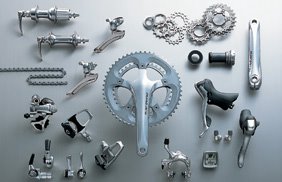The situation in China stems from economic unrest.
China Labor Watch reports that
The fact that China only stresses economic development has led to a host of social problems. In the course of this development, ordinary people who do not have a say in that development to begin with are paying the price.
We see that there are increasing numbers of strikes and displays of rebellion by workers. Social instability is becoming increasingly visible. In 2003, there were more than 58,000 industrial conflicts. In 2004, that number reached 74,000.
The gap between rich and poor is increasing; state-owned factories are closing and going bankrupt; workers are being laid off and losing jobs; peasants are leaving the countryside and entering factories where they have no long-term guarantees.
The problem with
globalization is that
While free trade has proved highly efficient in generating wealth, it has failed to share the spoils, intensifying gaps between rich and poor, urban and rural. In many instances, new wealth is coming at the direct expense of the poor as local governments sell off land for development projects.
...A recent study conducted by the World Bank found that incomes among rural Chinese -- about three-fourths of the total population -- have declined slightly in the years since China entered the WTO, while urban residents have enjoyed modest gains.
So the message from China is mixed. Yes, over the last 20 years, overall extreme poverty has dropped drastically (from 53% to 8% ... albeit the poverty line is set at between
150-300 yuan), but class separation has increased.
The
CIA reports that
From 100 to 150 million surplus rural workers are adrift between the villages and the cities, many subsisting through part-time, low-paying jobs. Popular resistance, changes in central policy, and loss of authority by rural cadres have weakened China's population control program, which is essential to maintaining long-term growth in living standards.
however, unemployment is
9.8% in urban areas; substantial unemployment and underemployment in rural areas; an official Chinese journal estimated overall unemployment (including rural areas) for 2003 at 20% (2004 est.) [and % of population below poverty line is] 10% (2001 est.)
Consequently, the rapidly separating classes in China, in addition to the relative ignoring of rural Chinese by the government, set the stage for riots and regime change.
Also, during the cultural revolution, Mao succeeded in killing many people who believed in democracy who didn't make it to Taiwan. Therefore, the number of people in mainland China who remember democracy and want it is small. This means that although China is dealing with foment and insurrection, change will not happen overnight, but may take 20 years.
Vietnam poses and interesting comparison to China. It also is a communist-governed country trying to exist with a progressively more open, free-market economy. Consequently, it must grapple with the same issues inherent in a free-market economy that China is currently grappling. However, the demographics of Vietnam and it's political situation are quite different. The
United Nations Development Programme shows that Vietnam has 74% of its population in rural areas. China has the same % in rural areas, but is undergoing urbanization much faster, and therefore has a higher % of people in the transient category--without stable jobs or homes in either rural or urban areas. Vietnam has only a 1.9% unemployment rate.
**This is important. If you
list countries by unemployment rate, Vietnam ranks 12th out of 196 countries for whom the CIA publishes data. By comparison, the United States of America ranks 48th with a 5.5% rate and China ranks 89th with a 9.8% rate. **
According to the national poverty line, Vietnam has a little more poor than China, at 12.9%, but according to the international line it is
28.9%. This is higher than China's published rate, but as I reported earlier, poverty is at thought to be at least 20% in underreported rural areas, and so the figures are probably similar.
Although poverty is still a problem in Vietnam, one must not underestimate the value of a job--even one that does not put a lot of food on the table. A job helps a person to feel he/she has self worth, gives him/her less time to be discontent and as shown in Vietnam, can allow a family to join together funds to help one member gain education and move up the social ladder. That being said, Vietnam has dealt with riots. This was talked about in
The Economist, (subscription required) almost five years ago, when The Economist wrote,
political pressures and criticism will keep bubbling up. Along the main avenue in Ho Chi Minh City, a group of some 100 protesting peasants have been allowed, for months, to voice their anger publicly at being displaced from their land. ...The banners and placards are critical of official decisions—although they avoid direct criticism of the government, and each studiously praises Ho Chi Minh.
...Such protests over land could become the most serious flashpoint in Vietnam. In both the cities and the countryside, the rules are unclear as to who owns what. Some minorities in the central highlands can own and sell their land, and may even pass it on to their children. But most Vietnamese are given only leases on their land—which the government may reassess and share out again at a later date. Demonstrations over land claims and corruption, as in China, have erupted in the poorer northern provinces and elsewhere. Now they are spreading to the cities. In mid-October, farmers from the north staged a protest in central Hanoi against corruption.
Politically, Vietnam does not have the luxury of being a huge 600 lb. gorilla on the block like China, nor the hubris of being the "dragon kingdom." It has a history of being conquered by China--even longer than the French--and therefore needs the help of the United States. It also is not in the
WTO yet, and needs America's help to gain entry to the WTO and its economic benefits.
Socially, Vietnam never underwent a "cultural revolution" like China. The Vietnam war was a war of unification, a civil war. Although many South Vietnamese escaped to the United States and Europe, many stayed in Vietnam. Also, Vietnam in general had more experience with democracy as a colony under France, and then South Vietnam under the United States, than China had before Mao. People who live in the south still remember what life was like. Many have family in Europe and the USA, I would venture to say a larger percentage of the population than in China, and they are influenced by family members sending money back as well as in thought. Even children of party members sent to the US or Europe become influenced by western thought. Then they return and enter public service in Vietnam.
Finally, and here's the culmination of the argument, it all adds up to people's acceptance of Vietnam in its current state. Vietnam focuses on stability while China focuses on economic power. Nguyen Cong Tan, deputy prime minister, said Vietnam must
strike a very good balance between economic growth and stability.
...We must pay a lot of attention to stability. We have gone through many anguishes and wars. Not every country is stable. We must focus on keeping stable. A gap between rich and poor can lead to instability.
Sure Vietnam's not perfect, and definitely needs to address certain issues, but it is not undergoing the social insurrection that China is. Its people have jobs, the government is willing to make concessions for economic gain, they have religion (which China does not--and that helps breed freedom of thought and acceptance of differences), and although there is increasing class separation and poverty, Vietnam is slowly combatting these issues.
Therefore, I could see change coming to Vietnam quicker than China, but I do not see riots and violence as the method. Vietnam deals with those things, but not to the extent China does. I think the new generation will enter the party, assume positions in the government, and govern according to their experiences, that include life in Vietnam as well as life in the USA. By necessity, as they work for less corruption, greater efficiency, and improving quality of life, they will adopt the traits of government that best allow seamless governing and progression. A couple weeks ago,
The Economist (subscription required) wrote about this (Nov. 26th edition) mixture of privatization, good and bad, and said,
There are problems, of course. The authorities have recently conceded that Vietnam will not join the World Trade Organisation this year, as they had hoped. Indeed, Vietnam is in the midst of trade disputes with both the United States and the European Union. It stands accused of exporting everything from catfish to bicycles at predatory prices. But Vietnamese exporters seem remarkably adaptable.
...Exports continue to grow at a steady clip of 20% or so a year. Seen in that light, Vietnam's many trade disputes are not so much a concern as a heartening indication of how competitive the country's exports are.
...Economists complain that Vietnam has plenty of tiny mom-and-pop outfits and big state-owned or foreign-invested firms, but nothing in between.
...[The government] recently announced that it would start selling shares in one of its four banks—but not a controlling stake, and only in small instalments spread out over five years.
The ultimate goal seems to be a web of partially privatised companies, subject to a certain degree of competition and market discipline, akin to Singapore's government-linked companies.
As long as Vietnam continues to make human rights and civil rights progress necessary to allow effective governing and gain entry into the WTO plus please the USA, people will not kick against the pricks. If, however, Vietnam reacts to something by clamping down on freedoms already enjoyed by the majority, I could see the process speeding up and including riots.




